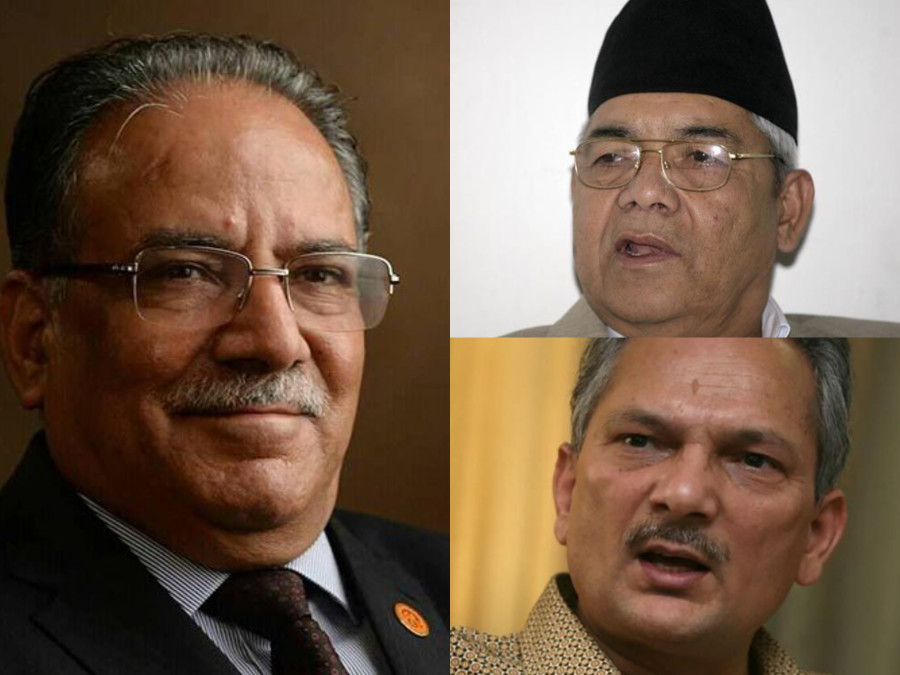Editorial
Anxiety of performance
Politicians form an electoral alliance with an eye on power and position rather than ideological integrity.
The tricky business of electoral politics schematises the coming together of strange bedfellows. Being the most popular legitimate path to power in a democracy, periodic elections are the biggest festival—at least for political parties, if not the people. This makes politicians spend enormous amounts of money, use all kinds of tricks against contenders, and make promises they know they will not fulfil. Loyalty, integrity and ideology can be transacted in shady dealings in the grey market of electoral politics. Yesterday's enemies become friends today if the outcome of the transformation is money and power.
Electoral politics legitimises every illicit transaction of political opportunists. This is what brings Baburam Bhattarai and Pushpa Kamal Dahal together after seven years. Press clips of their barbs at each other during their divorce in 2015 can put anyone to shame—but not them. It is politics, after all, and anything can happen in the name of the people. They know very well that they can take the Nepali people for a ride, and no one will bat an eyelid. Nepalis have for generations learnt not to feel betrayed by politicians. The politicians, meanwhile, have grown such a thick skin that no amount of suspicion or criticism of their actions is enough to bring a tinge of honesty in them.
While severing ties with the Maoist Party in 2015, in the wake of the promulgation of the constitution, Bhattarai had claimed Nepal had entered an era which needed a "new" kind of politics. The force never really took off as he wished, and his flirtations with Madhes-based parties brought nothing except dismay all over again. When asked if he would return to the Maoist Party at a later point, he had at that time negated the possibility unequivocally, saying, "chances of me joining an old or a cracked house is out of option". Having sailed rudderless for seven years, he has now navigated his way back to the same old destination from where he had departed for good. Standing at the door of the same old, cracked house after multiple failures in establishing a "new force", Bhattarai probably sees no contradiction. As of now, they have decided to contest the upcoming parliamentary elections under the same electoral symbol—hammer and sickle within a circle—but no one should be surprised if Bhattarai joins the party altogether.
Joining Bhattarai in his bid to come out a winner in the upcoming elections is Bamdev Gautam, another seasoned politician specialising in shifting goalposts every once in a while. He sees no contradiction in siding with KP Sharma Oli, Madhav Kumar Nepal or Pushpa Kamal Dahal as long as the story of political opportunism demands it. Having failed to gain much attention from any of the factions, Gautam opened a small, family-based political start-up of his own; but it took him less than just a few weeks to realise he could not go it alone. Not ones to be left behind, CPN-UML supremo KP Sharma Oli and Rastriya Prajatantra Party chairman Rajendra Lingden are reported to be in talks to strike an electoral alliance in a desperate bid to counter the Maoist-Congress-Samajwadi alliance.
This happens because the politicians, who have nothing but a bloated sense of self-importance to show for work, know that winning in elections is determined by their ability to bluff rather than do actual work. They have no shame in showing that there is no permanent enemy in politics, that ideology is replaceable with power and position, and that financial profit is the central force that keeps politicians together. As the elections come closer, there will be more defections, alliances and betrayals. The people should remember it all when they have the ballots in their hands.




 8.79°C Kathmandu
8.79°C Kathmandu














